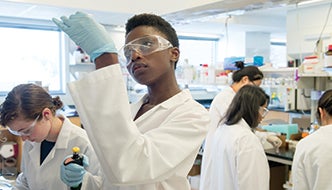Students from a dozen states and a variety of colleges and universities spent eight to 10 weeks on campus this summer engaged in several undergraduate research programs offered at Rensselaer.
Nearly 40 students from community colleges, Historically Black Colleges and Universities (HBCUs), and the Hispanic Association of Colleges and Universities (HACUs), as well as Rensselaer’s own Summer Undergraduate Research Program, worked with some 30 faculty advisers and two dozen graduate student mentors.
“Bringing a diverse community of researchers into our Institute is a key objective of the program,” said Elizabeth Herkenham, director of K-13 Education Outreach in the School of Engineering.
Students from such colleges as Tuskegee University, Morehouse College, the University of New Mexico, and the Universidad del Turabo in Puerto Rico worked on a variety of research projects, including Bluetooth solar measurement, copper grain growth analysis, characterization of power MOFSETs, and autonomous driving.
Participants presented the results of their research at a culminating poster session August 4 in the Center for Biotechnology and Interdisciplinary Studies.
“This event encapsulates a tremendous collaborative effort of all engineering departments, and tapped into multiple funding mechanisms, the brain power of our faculty, graduate students, and staff, and the use of our state-of-the-art facilities and equipment,” said Herkenham.
More than a dozen students took part in the Summer Research Experience for Undergraduates (REU) program at the Lighting Enabled Systems & Applications (LESA) Engineering Research Center.
“I greatly appreciate the knowledge and experience I have gained from my experience as a LESA-REU,” said Cya Johnson, a Vanderbilt University chemistry student who worked with vice provost and materials engineering professor Linda Schadler and graduate student Marissa Giovino. “It has given me a taste of what my life could be like as a scientific researcher.” Johnson’s poster title was “Synthesizing High Refractive Index Transparent Materials for Efficient Color Mixing.”
 Students from Savannah State University, UMass-Amherst, Fisk University, and Spelman College, among others, took part in the LSAMP program, which encourages undergraduates from underrepresented minority groups in the STEM fields to conduct research during the summer. The program is funded by the National Science Foundation, through the Upstate New York Louis Stokes Alliance for Minority Participation (LSAMP).
Students from Savannah State University, UMass-Amherst, Fisk University, and Spelman College, among others, took part in the LSAMP program, which encourages undergraduates from underrepresented minority groups in the STEM fields to conduct research during the summer. The program is funded by the National Science Foundation, through the Upstate New York Louis Stokes Alliance for Minority Participation (LSAMP).
“During my time here at the LSAMP program, I have confirmed my love for research, and developed the confidence to pursue my Ph.D.,” said Tayhlor Tanner, a biology student at Spelman College, who worked with chemical and biological engineering professor Cynthia Collins and graduate student Erin Kelly on spontaneous cross-feeding in bacteria.
A unique partnership included four students from Fulton-Montgomery Community College who took part in the NASA/New York Space Grant (NYSG) Community College Partnership Program hosted within Rensselaer.
Rensselaer is also a partner institution in the Center for Ultra-Wide-Area Resilient Electric Energy Transmission Networks (CURENT), a National Science Foundation Engineering Research Center jointly supported by NSF and the Department of Energy. CURENT supported a handful of student undergraduate researchers, as well as two teachers from the Watervliet City School District who developed curriculum for their technology classes on portable solar collection devices.
Erik Trinkle was one of nine Rensselaer students who took part in the Summer Undergraduate Research Program. He worked with biomedical engineering professor Mariah Hahn and graduate mentor Josh Erndt-Marino on exploring the potential of bioelectrical treatment for osteoarthritis.
“I’ve had a lot of support and learned so much about both my research topic and the general process of research,” said Trinkle. “It’s been a great experience overall.”


